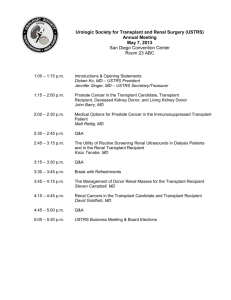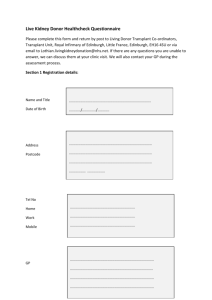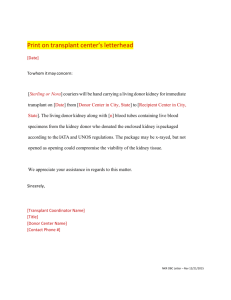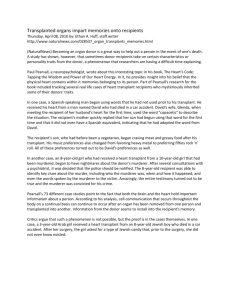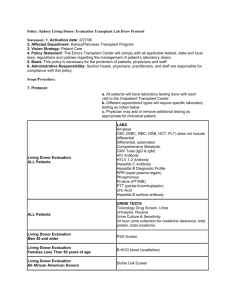Updates on Psychosocial Aspects of Renal Transplantation
advertisement
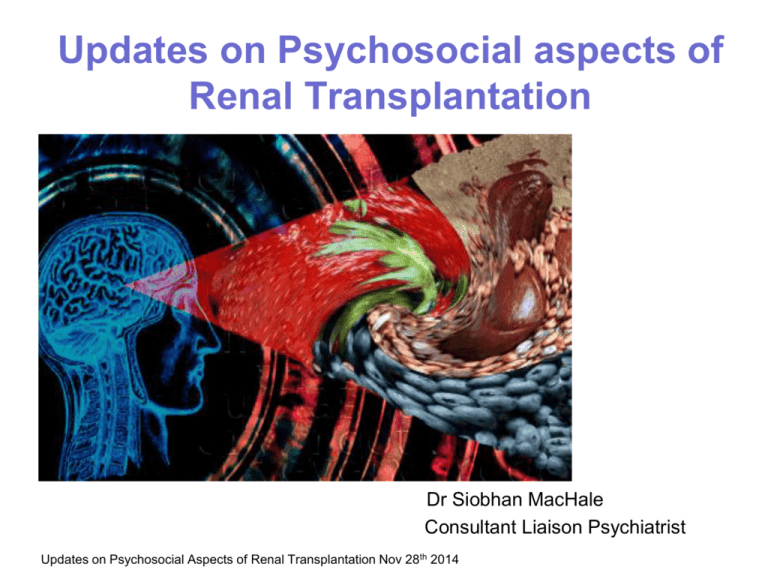
Updates on Psychosocial aspects of Renal Transplantation Dr Siobhan MacHale Consultant Liaison Psychiatrist Updates on Psychosocial Aspects of Renal Transplantation Nov 28th 2014 Physical & Mental Health – different or the same? • Chronic Kidney Disease • Depression – Kidney – Urea/Creatinine – Lifestyle intervention (+/- dialysis) +/- Medication – Brain – Serotonin – Lifestyle intervention +/- Medication Socially validated Stigmatised Disease Socio-Cultural Illness Physiology Psychological Impact of Kidney disease on Psychological Wellbeing • Huge variety (individual and over time) • Mild to severe, acute or chronic Impact of Health problems and Psychological factors on activity level Previous Level of activity Level of Activity Medical / Physical Problems Psychological Problems Time Distress is “Normal” • Continuum of Distress • Mild Moderate (Normal, adaptive) Severe (Disabling) Normal Reactions to an Abnormal Situation • Shock • Anger and Irritability • Denial • Sadness • Acceptance Dialysis patient Depression 20-30% Anxiety 20-40% Cognitive impairment Percentage of Patients Reporting > 0 Problems by Category 94.34% Distress Scores 10 60.38% 8 # of people 39.62% 6 24.53% 4 2 0 0 1 2 3 4 5 6 Score 7 8 9 Practical Family Emotional Physical Why is distress missed? • ‘Understandability’ of emotional response • Confusion re possible organic aetiology • Unsuitability of clinical setting for discussion • Stigma ‘Don’t ask, don’t tell’ AVOID “medicalising” distress miss significant psychological problems Psychological Components of Symptoms • Determine whether or not a person seeks medical advice – Belief that it’s “not right”/ “something serious” – Primary, secondary , tertiary gain • Often remain hidden (covert) during the consultation • Determine the outcome of physical illness – Quality of life – Duration of disability – Mortality Psychological Components of Symptoms • Determine whether or not a person seeks medical advice – Belief that it’s “not right”/ “something serious” – Primary, secondary , tertiary gain • Often remain hidden (covert) during the consultation • Determine the outcome of physical illness – Quality of life – Duration of disability – Mortality When Emotional Difficulties become overwhelming… • Affect quality of life • Ability to manage treatment • Fatigue, insomnia, low self-esteem, inactivity, depression… • Adjustment disorder commonest Fatigue Previous Level of Functioning Level of Activity Time SYMPTOM LEVEL MULTIDISCIPLINARY TEAM inc. Transplant Coordinators, Medical, Nursing, OT, Physio Preparation/Transie nt distress INTERVENTION Education/Training of Patients/ Families by MDT/IKA Mild - Moderate distress Eg adjustment problems, difficulty coping, mild-moderate depression/anxiety, family work, ambivalence re renal transplant Renal Counsellor Social work Selected potential living related recipients Severe distress Eg depression, OCD, non-compliance, personality assessment, psychological formulation Clinical Psychology All potential live donors (Non-directed Altruistic donors) Organic states/ suicidal/ psychosis eg pharmacotherapy, complex delirium, complex capacity issues Psychiatry Selected potential live donors (Non-directed Altruistic donors) STEPPED CARE APPROACH Beaumont Hospital Renal Psychosocial Care Pathway (RPCP) Chronic Kidney Disease Stage 1-5 Dialysis Transplantation Ambulatory Care Nurses Pts & Family Medical Assessment Suitability for Transplantation Ambulatory Care Nurse, Social Work Leaflet, Psychology as required. Education & Support · · · Multidisciplinary Team Education Day Patient & Family Pt. Care Coordinator +/Counsellor Assessment Txp Options Patient & Family Dialysis Nurses Pt. Care CoordinatorEducation/ Support Refer Counsellor if Appropriate - NIS Stepped Care Deceased Donor Transplant Multidisciplinary Team Paired Transplant Transplant Coord. Donor Family Support Recipient/ Donor Recipient Donor Recipient MDT MDT & Transplant Coordinators MDT Intervention Ongoing Support Ongoing Support Ongoing Support Education/ Training of Patients/Families Stepped Care as appropriate Stepped Care as appropriate Stepped Care as appropriate Stepped Care Symptom Level Living Donor Transplant MDT Referral Social Work E112 Ongoing Support Stepped Care Transient Distress Mild-Moderate Distress Stepped Care as appropriate Medical Team/Surgical/ Ambulatory Care Nurses/ Pt Care Coord Renal Counsellor/Social Worker Ambulatory Care Nurses 2 Year Evaluation Severe Distress Clinical Psychology Post Transplant Adjustment Organic States/Suicidal/ Psychosis Psychiatry *If any queries contact Renal Counsellor Ext. 3931 Bleep 828 Social Worker Ext. 3195 Bleep 365 Nephrology Follow-up Beaumont or Primary Hospital Stepped Care As appropriate Relationship between mental disorder and transplantation •Pre-transplant Mental disorder may generate need for transplant Directly eg via ingestion of toxic substances Indirectly eg IDDM complicated by Eating Disorder As a result of treatment eg long-term lithium use Chronic illness may trigger mental disorder Mental disorder (past or present) may be entirely coincidental •Peri-transplant Organic mental disorder as a result of surgery and medical treatment Delirium Hallucinosis due to immunosuppressants ‘Steroid psychosis’, steroid-induced mood disorder •Post-transplant Mental disorder secondary to surgery and its consequences Adjustment disorder, post-traumatic stress disorder, Mood disorder Relapse of mental disorder that led to need for transplant – BPAD, DSH Behavioural problems threatening graft survival Non-adherence, substance misuse Source: Owen JE et al. Psychosomatics, 47(3):213-22, 2006 Increased risk if • Personal/family hx of mental health problems • Substance misuse • Adverse social circumstances • Unpleasant/demanding Rx • Certain drug Rx eg immunosup/steroids May exacerbate physical symptoms Psychiatrist’s role in transplant • Widen the live donor pool eg – – – • hx mental disorder no mental disorder but relationship appears dysfunctional altruistic Select among potential recipients eg – – Loss of previous transplant due to nonadherence Bipolar affective disorder, substance misuse ie discriminate against patients on basis of likely outcomes rather than entire groups • Improve transplant outcomes – Adjustment adaptation to transplantation is a lengthy process – Adherence ADHERENCE ISSUES “The extent to which the patients’ actions do not accord with medical recommendations” Non-adherence to medication regimens after kidney transplantation is a major risk factor for acute rejection and graft loss •Rate of non-adherence to immunosuppressant medication highest among kidney transplant recipients compared with recipients of other types of solid organ transplant •Up to 67% do not take immunosuppressive medications as prescribed Case examples • Cadaveric • Non adherence • Live Donor – donor • – recipient • Cognitive impairment • Substance misuse Cadaveric recipient • Adjustment difficulties +++ • Expectations vs reality Case examples 65 yr old M • Post transplant behavioural disturbance 22 yr old M • Post transplant abdominal pain • Delirium on underlying cognitive impairment • New onset IDDM • Somatoform pain disorder • Difficult social circumstances ++ • Previous trauma++ • Non adherence with immunsuppression/insulin • Lack of social supports Live donor assessment Key areas (1) experience of pressure / coercion to donate (2) clear, realistic understanding of the transplant journey / operation (capacity for informed consent) (3) comprehensive assessment of emotional/mental state to ensure free of distress or unhelpful motivations to donate (4) ensure they have adaptive / healthy coping skills to withstand any potential stressors (5) assess and intervene with significant others when appropriate to ensure supportive relationships in place (6) Deal with any ambivalence about decision to donate Major psychosocial contraindications for live donation (Delmonico & Dew, 2007) include: •(a) ongoing psychiatric or substance use problems, •(b) the presence of major financial stressors that could either have a coercive effect on the donor’s decision to donate, or significantly worsen as a result of donation and any medical complications, •(c) evidence that the prospective donor has experienced undue pressure or coercion from others to donate, •(d) a limited understanding or capacity to understand the donor’s own or the transplant candidate’s risks and benefits from kidney donation, and •(e) ambivalence about proceeding with the donation. Indication for referral for psychiatric opinion Mental illness Maladaptive coping strategies – substances, ED, SH Non-adherence In case of LD, problematic family relationships Hypothesis – a healthy human transaction Baseline Post-op 4 months Post-op 12 months • Strong, respectful relationship between donor and recipient • Realistic expectations of outcome • Gift is given without “strings attached” • Gift is received without feeling obligated • Donor experiences positive psychological health • Eg “A spiritual experience” Hypothesis – how it can go wrong Unrealistic Fantasised Expectations: The Trap in Live Renal Donation Baseline Post-op 4 months Post-op 12 months • Troubled relationship between donor and recipient • Unrealistic fantasised expectations of donor • Metaphorically the recipient does not “clinch the deal” • Donor devastated as expectations unmet • Donor feels depressed eg “I feel like I’ve been used as a spare part and discarded” LD Followup (Dew et al 2007) • 95% would donate again • 72% +ve feelings about themselves BUT • 24% sig psychological distress • 12% health is worse • 25% worry about health/remaining kidney • 23% financial distress Preventive Intervention for Living Donor Psychosocial Outcomes: Feasibility and Efficacy in a RCT Dew et al American Journal of Transplantation 2013; 13: 2672–2684 Balance in live donation recipients : donors ‘Among the highest priorities in transplantation are the protection of donors’ well-being and the prevention of adverse consequences of donation’ Adverse medical consequences & Adverse psychosocial outcomes Adverse psychosocial consequences • Somatic complaints (fatigue/pain) • Psychological distress (dep/anxiety) • Strained family relationships >50% all donors despite rigorous evaluation protocols Selective preventive intervention – residual ambivalence A consistent predictor of poor psychosocial outcomes Motiviational Interviewing intervention effective Residual ambivalence ‘Lingering feelings of hesitation and uncertainty that remain after the prospective donor’s predonation evaluation and the coexist with his/her intention to donate’ ~75% Vs acute ambivalence - <3% of rule outs Intervention - Motivational Interviewing to enable PDs to resolve ambivalence Phase 1 study – acceptability and relevance of intervention Phase 11 study - RCT LD Recipient Case examples 54 yr old F • Anxiety Disorder++ inc needle phobia 22 yr old F •Previous graft loss from non adherence •Brother potential donor – have never discussed transplant LIVE DONOR BPS SCREENING Trans coordinators* *Post out BiopPsychoSocial questionnaire BPSQ Nephrologists Screening Absolute Contraindications: *Active dependent substance misuse (drugs or alcohol) *Dementia *Active psychosis –back to referrer for local service intervention Clear Evidence of coercion or financial benefit (* back to referrer for local service intervention) Relative contraindications: Harmful use of drugs/alcohol Limited understanding/capacity despite education Ambivalence Refer to Psychology if Relative contraindications as above Significant BPSQ emotional distress Significant anxiety/distress on contact with team members Psychiatry if Past history of psychosis Past history of inpatient psychiatric care Past history of suicidal ideation Social Work if Significant social issues arising from BPSQ Significant financial issues arising from BPSQ * Post out Psychological Wellbeing Index Ambivalence Questionnaire Live Donor Health & Lifestyle Questionnaire RECIPIENTS BPS SCREENING Nephrologists Post out BPS questionnaire Screening Absolute CI: *Active dependent substance misuse (drugs or alcohol) *Dementia *Active psychosis –back to referrer for local service intervention Clear evidence of coercion or financial benefit (* back to referrer for local service intervention) Relative contraindications: Harmful use of drugs/alcohol Limited understanding/capacity despite education Ambivalence Poor adherence/compliance Refer to stepped Care Model + Social Work if Screening questionnaire positive Significant social/financial issues Psychology if Relative contraindications as above Significant BPSQ emotional distress Significant anxiety/distress on contact with team members Psychiatry if Past history of psychosis Past history of inpatient psychiatric care Past history of suicidal ideation OTHER RENAL REFERRALS • Most referrals come from the dialysis unit/ wards/ renal clinic for issues other than transplant eg • Diagnostic – sorting out the interplay between medical problems (sepsis, anemia, delirium, etc) and psych symptoms – excluding depression in cases of dialysis refusal – assessing capacity • Treatment – Management of acute behavioural disturbance – Treatment of mood disorders RECIPIENTS 2 yearly SCREENING • MOCA 1.MOCA 2. Alcohol units/week • ALCOHOL UNITS WEBSITES • www.beaumont.ie/renalunit • www.beaumont.ie/marc • www.ika.ie www.nkf.co.uk www.Ihatedialysis.com www.nkf@kidneys.org www.nipka.org • www.getselfhelp.co.uk www.helpguide.org. Treatment Works! • Information +++ • Social support • Addressing worries • Anxiety management Discussion Psychiatric Assessment • Informed consent – Recipient's illness – Transplant surgery and process • Relationship • Decision-making process – – – – – How they were enlisted? How was it made? Motivation Voluntariness - persuasion.manipulation.coercion Ambivalence, Indebtedness, nature of "gift", expectations • Psychiatric history/Coping style/Substance use history/Social history/Supports, finances, insurance • Reactions of others, views of family • Ability to access follow-up - especially for overseas donors • Right to reconsider and what would influence ability to do so • Fill in the gaps in their knowledge inc Psychological outcomes • Follow-up The psychiatric exploration • The relationship between donor and recipient (the length of the relationship, its unique course, any disjunctions, and inequalities real or imagined) • Donor’s motivation and expectations (realistic or fantasised) • Coercion (visible or masked) The exploration of family dynamics • What is the level of cohesiveness between the “identified donor” and the potential recipient within the family • How do important others feel about the donation (e.g the in-law in adult sibling donations) • Is the donation a way for the potential donor to “shore up” his or her status within the family – what are the implications if this does not happen? • How would the donor deal with rejection or the ungrateful recipient?

